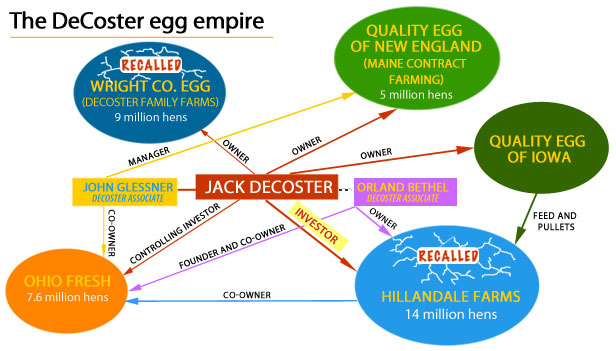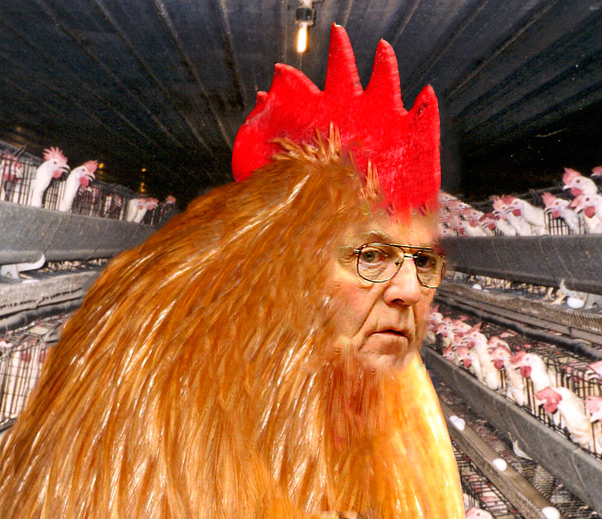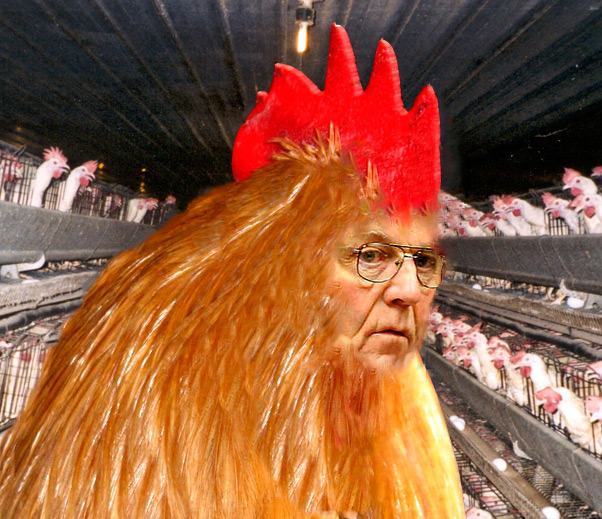 The web of companies that DeCoster controls either directly or through proxies, with the now-confirmed even closer link between the chick magnate and Hillandale Farms.Grist infographc
The web of companies that DeCoster controls either directly or through proxies, with the now-confirmed even closer link between the chick magnate and Hillandale Farms.Grist infographc
 Grist composite from images courtesy of Lewiston Maine Sun Journal, FarmSanctuary, and Dru!/FlickrIn a post earlier this week, I showed that a man with a 15-year history of labor, environmental, food-safety, and animal-welfare violations stands at the nexus of several tightly linked companies that, together, produce more eggs than any other U.S. firm. Now I can say it outright: Austin “Jack” DeCoster, who was once called by the state of Iowa a “habitual violator” for flouting its environmental codes, controls the largest U.S. egg conglomerate.
Grist composite from images courtesy of Lewiston Maine Sun Journal, FarmSanctuary, and Dru!/FlickrIn a post earlier this week, I showed that a man with a 15-year history of labor, environmental, food-safety, and animal-welfare violations stands at the nexus of several tightly linked companies that, together, produce more eggs than any other U.S. firm. Now I can say it outright: Austin “Jack” DeCoster, who was once called by the state of Iowa a “habitual violator” for flouting its environmental codes, controls the largest U.S. egg conglomerate.
He evidently doesn’t want to publicly wear the King Rooster crown, because he keeps his ownership of several of the companies in his empire under a cloak. In the egg industry’s official league table, DeCoster Family Farms is just the ninth-largest U.S. producer.
What kept me from declaring DeCoster the outright ruler of the roost in the previous post was that I could not show he had a direct ownership interest in Hillandale Farms, the company that joined DeCoster’s Wright County Egg in releasing 550 million salmonella-tainted eggs, sickening at least 1,500 people.
But new information has emerged establishing that DeCoster has a significant ownership stake in Hillandale.
A Friday Wall Street Journal article shows that FDA inspectors are zeroing in DeCoster’s Iowa chicken-feed facility as the likely source of the salmonella outbreak. The facility supplied feed to both DeCoster’s Wright County Egg and Hillandale. Here’s the clincher: the state of Iowa allowed DeCoster’s feed mill to operate without regular inspections because it only supplied feed to its own hens. (Why this is OK, when it still could have sickened thousands of consumers, is another matter.) By supplying feed to Hillandale from an uninspected facility, DeCoster was either violating Iowa code — or doing so legally because he has an ownership stake in Hillandale.
The WSJ article establishes the latter to be the case. A spokesperson for the Iowa Department of Agriculture that “state inspectors visit [feed] mills every two years to monitor sanitary conditions, but didn’t oversee Wright County Egg’s feed because it didn’t sell the feed commercially,” i.e., to outside companies. The WSJ continues: “Wright [County Egg] supplied its feed to one of two facilities at Hillandale, a farm with which Wright is financially affiliated, said Hillandale’s spokeswoman.”
So there you have it: Hillandale’s spokeswoman — who didn’t return several calls from me earlier this week — confirms that DeCoster-owned Wright County Egg is “financially affiliated” with Hillandale.
I now officially crown DeCoster king of the hen yard! Overall, 340 million hens sit caged in U.S. factory-style farms. Adding up the hens controlled by all of his companies, as I did in the previous post, we find that DeCoster controls 35.6 million hens — more than the putative No. 1 eggery, Mississippi-based Cal-Maine, which owns 28 million hens.
This means DeCoster owns more than a tenth of the U.S. egg market, which is also much more consolidated than previously believed. Crunch the numbers in Cal-Maine’s table of top U.S. egg producers, located in its 2009 investor report, and you’ll think that the top ten U.S. producers control 125 million hens, or a little more than a third of the market. But when you correct Cal-Maine’s chart with this new information about DeCoster’s ownership web, you’ll find the top ten companies control 156 million hens, or about 46 percent of the market.
Meanwhile, the post-recall Congressional investigation is turning up more unsavory information about the egg king. DeCoster’s Wright County Egg found salmonella in its hen houses 73 times since 2008, records released in a Congressional hearing show. It sent eggs out anyway. And USDA inspectors repeatedly found unsanitary conditions at DeCoster’s facilities during that time frame, and also heard complaints from company employees about “leaking manure and dead chickens.”
The House Energy and Commerce Committee is now demanding that DeCoster turn over sanitation records from his facilities in Maine. I can’t wait to find out what evils lurk in those hen cages.



